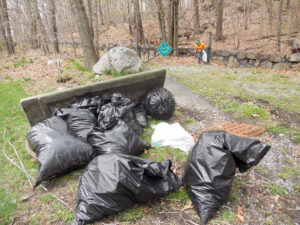Almost 60 Mass Cities and Towns Restrict Checkout Bags
by Terese Hammerle

Above, a disposable plastic bag is snagged in a tree at the Coal Road area of Lone Tree Hill. (Radha Iyengar photo.)
Our environment is swimming in plastic waste. The Sierra Club and others commonly assert that Americans use 100 billion plastic bags a year, or about 360 bags per year for every man, woman, and child in the United States. Massachusetts residents go through about 2 billion bags annually.
These are 2010 estimates, when Washington, DC, became the first major US city to impose a fee on disposable paper and plastic bags. (“Disposable” indicates single-use; “reusable” means a heavier quality for multiple use.) Currently, about 60 Massachusetts cities and towns have bans in place on disposable bags, and more are considering or in the process of enacting such ordinances.
Mass Green Network (massgreen.org), a nonprofit founded in 2015 in Boston to aid local efforts to reduce plastic waste, provides a comparison of the rules that these municipalities have enacted.
The typical plastic shopping bag is made of polyethylene (LDPE, or low-density polyethylene), weighs 6–8 grams, and is sourced from fossil fuels, usually natural gas feedstock. Most municipalities’ rules ban “thin” bags, but merchants may provide a recycled paper bag or a “reusable” plastic bag. Defining “reusable” is the crux of the issue. Is the bag 3 mils (3 one thousandths of an inch) or 4 mils? Does it have to be washable?
Cities and towns intend that shoppers bring their own reusable bags, but in reality, disposable free plastic checkout bags are still flying out of stores, sometimes even thicker and nicer than they used to be.

Each year, volunteers at Lone Tree Hill fill many bags like those shown above with plastic and trash that should have been recycled. (Radha Iyengar photo.)
Cambridge and Brookline Charge
Two municipalities have taken bigger steps. In 2014, Cambridge mandated a fee for bags. A recycled paper bag or a compostable plastic bag costs 10 cents at checkout and thin-film bags are excluded. In 2012, a Brookline bylaw prohibited plastic bags thinner than 2.25 mils.
According to Clint Richmond, Sierra Club volunteer, merchants like CVS merely began distributing 2.25 mil bags that are still flimsy and disposable. Since then Brookline has taken thickness out of the equation by banning all polyethylene bags.
The number of Massachusetts towns so far that have passed bans on disposable plastics has been rising steadily each year: 2012 (1), 2013 (1), 2014 (4), 2015 (11), 2016 (19), 2017 (22), for a total of 58.
Cities and towns intend that shoppers bring their own reusable bags, but in reality, disposable free plastic checkout bags are still flying out of stores, sometimes even thicker and nicer than they used to be.
A New Initiative Starts in BelmontWhen any kind of plastic bag is tossed away, where does it go? In Belmont, plastic bags cannot be recycled curbside. According to Mary Beth Calnan, Belmont’s recycling coordinator, the bags clog the recycling machinery, requiring work stoppage and risking injury to the staff who need to manually remove the bags. (Most grocery stores have a bin near the entrance where you can recycle them.)
In conjunction with Sustainable Belmont, a new working group has formed in town to consider how to go about proposing a plastic bag ban. The group will be consulting with the local business community, reviewing how nearby municipalities have implemented such bans and their relative success, and considering how to educate the general public about this issue. If you’d like to get involved or learn more, please contact me at TereseHammerle@me.com, or Linda Levin-Scherz at llevinscherz@gmail.com.
Terese Hammerle is a member of Sustainable Belmont.


Sorry, the comment form is closed at this time.